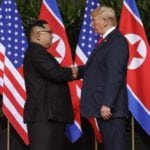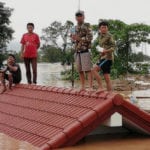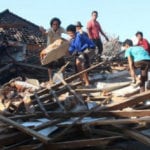 Weird Stuff
Weird Stuff  Weird Stuff
Weird Stuff  Animals
Animals 10 Inspiring Tales of Horses Being Human
 Mysteries
Mysteries Top 10 Haunting Facts About the Ghost Ship MV Alta
 History
History 10 Surprising Stories About the Texas Rangers
 Humans
Humans 10 Philosophers Who Were Driven Mad by Their Own Theories
 Miscellaneous
Miscellaneous 10 Video-Game-Worthy Weapons and Armors from History
 Weird Stuff
Weird Stuff 10 Psychics Who Accurately Predicted Wartime Events
 The Arts
The Arts 10 Pieces of Art Inspired by a Broken Heart
 Health
Health 10 Science Fiction-Sounding New Medical Treatments
 History
History 10 Surprising Facts About the Father of Submarine Warfare
 Weird Stuff
Weird Stuff 10 Times Real Laws Were Based on Bizarre Hypotheticals
 Animals
Animals 10 Inspiring Tales of Horses Being Human
 Mysteries
Mysteries Top 10 Haunting Facts About the Ghost Ship MV Alta
Who's Behind Listverse?

Jamie Frater
Head Editor
Jamie founded Listverse due to an insatiable desire to share fascinating, obscure, and bizarre facts. He has been a guest speaker on numerous national radio and television stations and is a five time published author.
More About Us History
History 10 Surprising Stories About the Texas Rangers
 Humans
Humans 10 Philosophers Who Were Driven Mad by Their Own Theories
 Miscellaneous
Miscellaneous 10 Video-Game-Worthy Weapons and Armors from History
 Weird Stuff
Weird Stuff 10 Psychics Who Accurately Predicted Wartime Events
 The Arts
The Arts 10 Pieces of Art Inspired by a Broken Heart
 Health
Health 10 Science Fiction-Sounding New Medical Treatments
 History
History 10 Surprising Facts About the Father of Submarine Warfare
10 Mind-Blowing Things That Happened This Week (10/6/17)
Keeping up with the news is hard. So hard, in fact, that we’ve decided to save you the hassle by rounding up the most significant, unusual, or just plain old mind-blowing stories each week.
The first week of October was a grim week for anyone watching the news. Heartbreaking scenes from Las Vegas filled the airwaves, reminding us that sickening violence can happen anywhere at any time. While we’ll endeavor to keep you updated with what was happening elsewhere over the last seven days, there was no ignoring the appalling bloodshed on display in Nevada or the awful human tragedies that accompanied it.
10 The US Suffered Its Deadliest Ever Mass Shooting
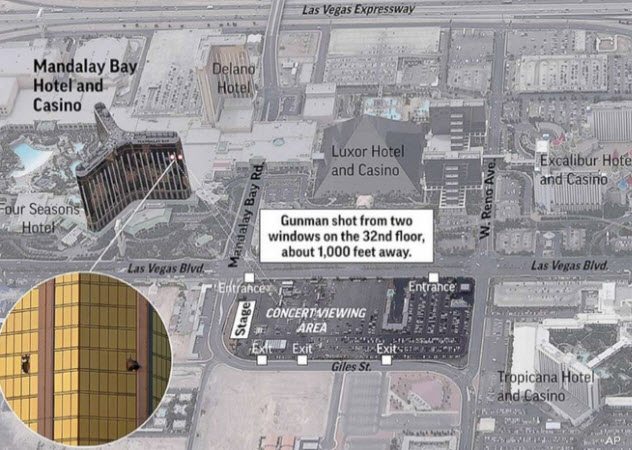
On Monday evening, a vast crowd gathered in Las Vegas for the last day of the Route 91 Harvest Festival of country music. Up on the 32nd floor of the nearby Mandalay Bay Hotel, a 64-year-old man named Stephen Paddock smashed two windows in his luxury suite, picked up a rifle, and started firing into the crowd below.
There was chaos. Concertgoers stampeded. Less than 15 minutes after the shooting started, 58 innocent people were dead and nearly 500 were wounded. The attack was by far the deadliest mass shooting in US history.[1]
The killer was a wealthy gambler and real estate investor who had no prior history of violence. His victims came from all walks of life: off-duty cops, nurses, teachers, parents, bankers, and plain old regular folks who just wanted to enjoy the concert.
Unlike the previous deadliest mass shooting at the Pulse nightclub in Orlando, there was no obvious motive in Las Vegas. For whatever reason, this awful man just spontaneously decided to ruin as many lives as possible.
For those who wish to do what they can to help, you can donate directly to the victims’ fund by following this link.
9 The Internet Disgraced Itself Trying To Politicize The Vegas Killings

When 58 people are dead, hundreds more injured, and thousands traumatized, the correct reaction is to mourn, help where we can, and reflect. Many did just that. Las Vegas saw record-breaking blood donations following the massacre, and regular folk have donated nearly $10 million to the victims’ fund as of this writing.
But not everyone was so empathetic. Online, a disgracefully large number of people responded to the shooting by turning it into a political blame game.
This behavior came from all sides and paints no one in a good light.[2] Right-wing trolls falsely linked the killings to an anti-Trump liberal. Left-wing trolls could barely keep the glee out of their voices when they discovered that the shooter was a white man.
Attempts were made to “prove” that the shooter had converted to Islam despite the FBI debunking ISIS’s claim of responsibility. (The terrorist group has a track record of claiming responsibility for attacks that aren’t their own, including a mass shooting in the Philippines motivated by gambling debts.)
To call these actions pathetic would be to dignify them with a human component. That there are people whose response to such a tragedy is to desperately try and blame the other side shows just how divided we’ve become.
It shouldn’t matter whether Paddock was wearing a “Bernie For President” badge or a “Make America Great Again” cap. What should matter is that his victims were ordinary people who didn’t deserve their fates. All our thoughts should be with them, not on trying to score points against people who hold different political beliefs than we do.
8 Colombia’s Largest Remaining Rebel Group Called A Truce
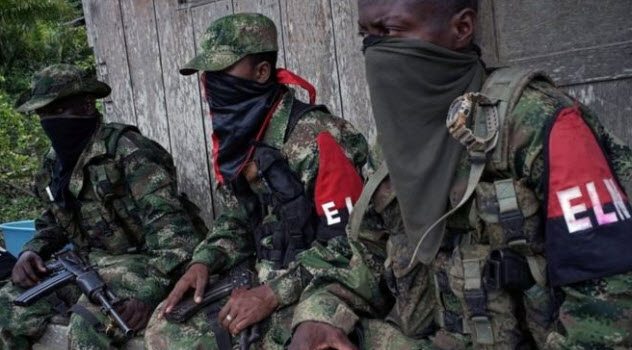
As carnage played across screens in the US, some good news was at least surfacing below the border in South America. After Marxist insurgent group FARC disarmed last year, the title of Colombia’s largest rebel group passed to the ELN.
A Marxist-Catholic organization, ELN is far smaller than FARC was and far less potent a force. Nonetheless, ELN’s continued kidnappings and attacks—including recently setting off a bomb in Bogota that killed one policeman and injured 20—have remained a thorn in the side of Colombia’s peace process.
Now, things may finally be changing for the better. On October 1, ELN’s high command called the group’s first truce in 50 years of fighting. It paves the way for peace talks with the Colombian government and possible disarmament.[3]
ELN is one of the world’s oldest rebel groups, having been founded mere months after their big brother FARC in 1964. Although ELN only numbers 1,500 fighters today, they were a viable army at their height. If peace talks succeed following this truce, it could finally end guerrilla violence in Colombia once and for all.
7 We Pledged To Eradicate Cholera
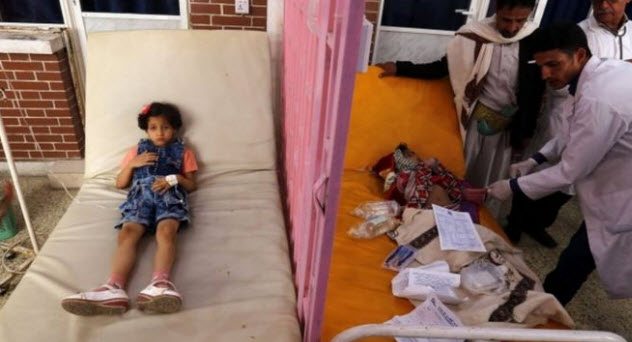
In global history, humankind has completely eradicated only one disease. Smallpox was declared history in 1980, three years after the final case was recorded in Somalia. We’ve come close with Guinea worm, with 2016 recording only two known cases (down from three million in 1980).
Now the world’s medical community has another disease in their sights, and it’s a biggie. This week, the World Health Organization pledged to eradicate cholera by 2030.[4]
Cholera is one of the biggest deadly diseases still out there. Nearly three million people contract it a year, and an average of 95,000 of them die. Right now, it’s causing chaos in Yemen, and it was similarly devastating in post-earthquake Haiti. Wiping it out would alleviate endless human suffering in poorer countries like Ethiopia, Nigeria, and parts of India.
So far, the pledge is simply that: a pledge, not a plan of action. Yet history shows that we can easily beat cholera when we put our minds to it. The last cholera outbreak in the US was in 1911. If one country can beat cholera, then so can the planet.
6 The Palestinian Authority Met For The First Time In Years
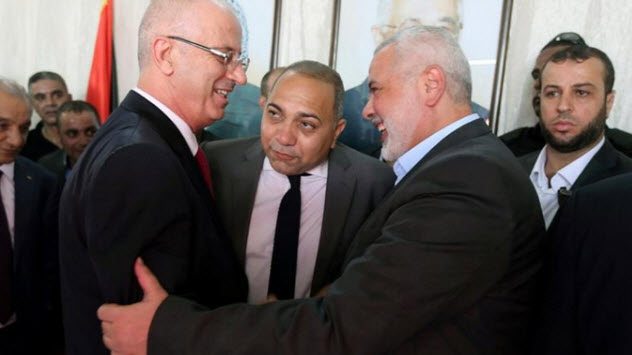
In November 2014, the Palestinian Authority had one heck of a falling-out. Following a summer in which Hamas had sparked a war with Israel from inside their Gaza enclave, the West Bank–governing party Fatah—headed by Palestinian President Mahmoud Abbas—cut contact with the terrorist group. In the years since, Fatah has tried to bring its Gazan rivals to heel by doing things like cutting electricity to the strip. Nothing worked.
Until now. This week, Hamas and Fatah met in Gaza for the first time in three years.[5] The move came as Hamas prepared to hand over the strip to Fatah, creating a unified Palestinian Authority for the first time since 2007.
This is important because control of Gaza by Hamas has been one of the main blocks in peace negotiations between Israel and Palestine. Hamas is considered a terrorist group by the US, EU, and Israel. Tel Aviv has said that negotiations are pointless if any treaty may be ignored in Gaza.
A reunited Palestinian Authority could lead to restarted talks . . . if Hamas agrees to give up its weapons and its fight against Israel. Fingers crossed.
5 Terrorism Returned To France And Canada
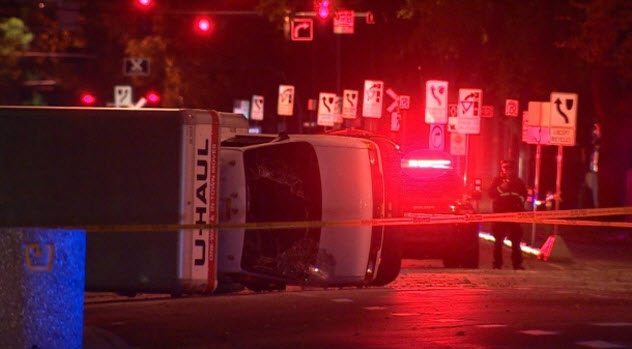
It’s a mark of how much things have changed in France since the Charlie Hebdo shootings that the terrorist stabbing of two women on Sunday was classed as a relatively minor incident. A man killed two cousins in front of Marseille’s main train station before being gunned down by soldiers. Their deaths brought the total number of French citizens killed by Islamist terrorism since January 2015 to 241.
France has suffered a wave of terrorist incidents, the largest of which were the Paris attacks of November 2015 which killed 130 people. But Sunday’s attack was the first to kill more than one person since a truck plowed through crowds in Nice during Bastille Day 2016. We hope that this attack marks the last gasp of an ideology that’s had its day in France.[6]
On the other hand, Canada has no such recent history of Islamist terrorism, beyond the October 2014 attack on the parliament building which killed one. On Saturday, Abdulahi Hasan Sharif tried to change all that by ramming a truck into pedestrians after running over and stabbing a police officer. Although he badly injured five people, thankfully, he failed to kill anyone before being captured.
4 Crisis Brewed On Battered Puerto Rico
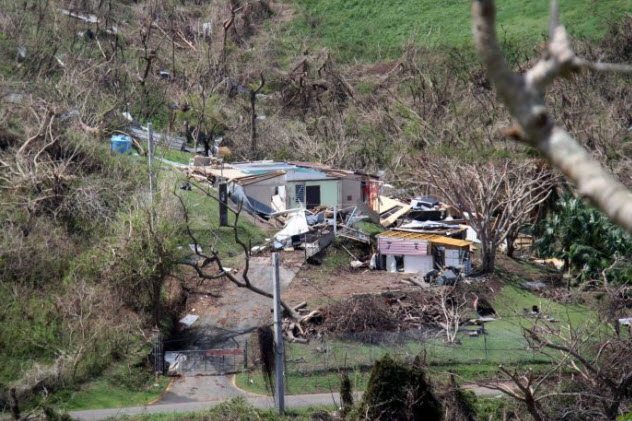
Two weeks ago, Hurricane Maria made landfall in Puerto Rico, causing catastrophic devastation to the US island. Approximately 3.4 million US citizens were left without power. Many also lacked clean water, food, and access to medicine.
A fortnight later, many outside the capital of San Juan are still waiting for help. With the death toll from Maria having doubled to 34, there are worrying signs that a crisis may now be brewing.[7]
The biggest issue is that Maria was just so powerful that Puerto Rico is effectively in ruins. Hospitals are barely functioning and may not be able to work properly again for some time. Combine that with a lack of water and food, and it’s clear that the post-hurricane crisis could be far worse than the direct impact of the storm itself.
One problem exacerbating the trouble has been the comparatively slow response from Washington. Some of that is the government’s fault. But a lot also has to do with the sheer force of Maria, which made placing supplies on the island before the hurricane—as is usually done before a big storm hits somewhere—effectively useless. We can only hope that the stricken territory recovers soon.
3 Separatism Protests In Cameroon Spiraled Into Bloodshed
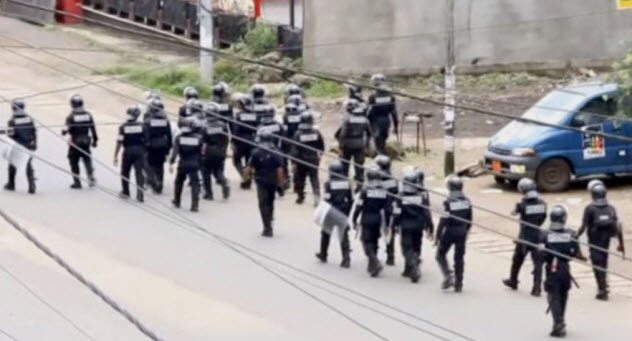
Cameroon is a former French and British colony wedged into the corner of Africa where west becomes south right next to Nigeria. Created from a merging of the British Cameroons and French Cameroon, it today has a French-speaking elite and a tiny English-speaking minority on the Nigerian border.
For years, the English speakers have felt oppressed by Francophone rule. This week, that desire for separatism spiraled into bloodshed as security forces opened fire on protesters. At the time of this writing, ongoing clashes have killed 17 people.[8]
The Cameroonian government, headed by long-term leader President Paul Biya, has been increasingly autocratic toward its English regions. On Tuesday, the Internet was shut down. Electricity had previously been cut off. But with protests and clashes growing in intensity, it seems to be only a matter of time before a full-blown crisis takes place.
2 A Former British Prime Minister May Or May Not Have Been Revealed As A Child Sex Abuser
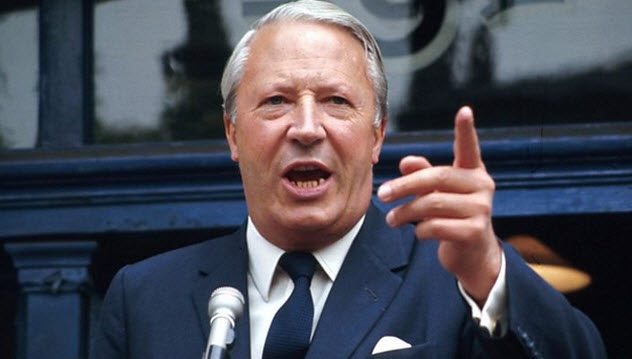
Wiltshire Police launched Operation Conifer in 2015, a probe into whether former British Prime Minister Edward Heath had sexually abused children. The story was big news: It partially focused on Satanic ritual abuse, and a related investigation into Lord Brittan was botched and destroyed an innocent man’s reputation.
This column has reported on the Heath allegations before, but it was only this week that Wiltshire Police released their official report. Their conclusions were either completely damning or a pathetic witch hunt, depending on whom you believe.
Operation Conifer’s official conclusion is that the former Conservative prime minister would be arrested for questioning if he were alive today. However, it also concludes that “no inference of guilt should be drawn from this fact.” Given that one count relates to Heath allegedly raping an 11-year-old boy, this inconclusive stance is helpful to nobody.[9]
Heath’s godson has called for an inquiry into the police, claiming that they have conducted a witch hunt. Meanwhile, others have claimed that a separate inquiry into obstruction of justice by people like Heath’s godson should be held. Meanwhile, we’re no closer to the truth.
1 Spain And Catalonia Faced Their Biggest Crisis In Decades
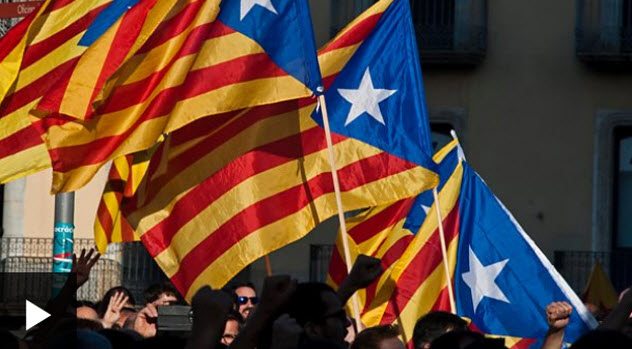
On Monday morning, you may wake up to find that Spain has shattered apart and Catalonia is the world’s newest country.
The autonomous province in northern Spain has long had a separatist streak to rival Texas. Last weekend, the regional leader, President Carles Puigdemont, held a referendum on secession that Madrid tried to block. (Secession is illegal under Spain’s post-Franco constitution.)
When Puigdemont refused to call off the vote, Spanish police got violent, resulting in around 900 ordinary Catalans being injured at polling stations. Images of the bloodshed were beamed across the region, inflaming separatist sentiment.
Simultaneously, Madrid was reacting with fury to the flawed referendum. Only around 43 percent of Catalans voted, undermining the 90 percent pro-independence result.
Nonetheless, Puigdemont has decided to push ahead with secession.[10] He was egged on by Spanish PM Mariano Rajoy’s threats of violence and an extraordinary address by the Spanish king that blamed Catalans for the police brutality they suffered. On Monday, the Catalan parliament will meet and probably declare independence.
What happens then, no one knows. It’s easy to forget that Spain has only been a democracy since 1978 and is far less stable and united than many think. Spanish tanks on the streets of Catalonia would bring back horrific memories of the civil war.
On the other hand, it’s hard to see Madrid agreeing to Catalan secession on the back of such a flawed referendum. A new referendum with clear legal standing and the participation of international observers seems like the only solution, but whether it will happen is anyone’s guess. More on this story as it develops next week.
Missed the news lately? Catch up on more mind-blowing events from September 29, 2017, and September 22, 2017.
